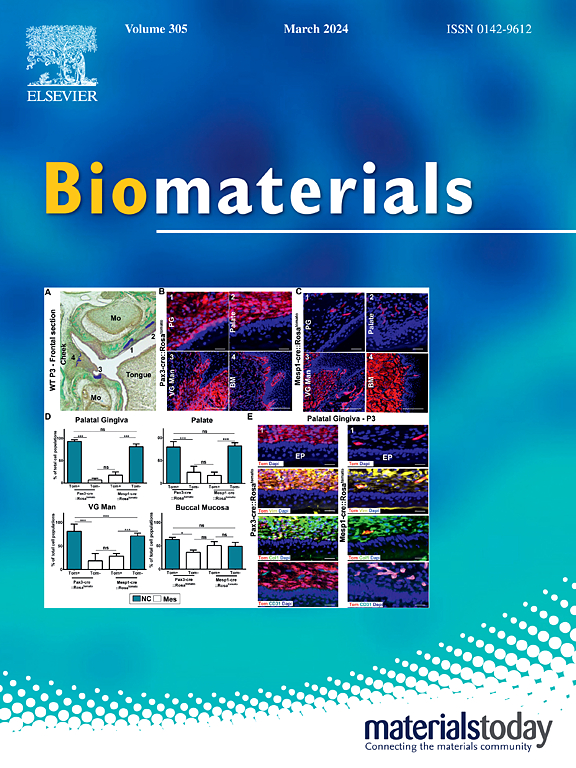Regulation of mitochondrial apoptosis via siRNA-loaded metallo-alginate hydrogels: A localized and synergistic antitumor therapy
IF 12.8
1区 医学
Q1 ENGINEERING, BIOMEDICAL
引用次数: 0
Abstract
Preventing relapse after resection of a primary tumor continues to be an unmet clinical need. Development of adjuvant biomaterials with the capacity to kill residual cancer cells after tumor resection is of clinical importance. Here we developed a library of metallo-alginate hydrogels containing high concentrations of metallic ions such as Ca2+ in combination with Zn2+, Li+, or Mg2+ to disrupt Ca2+ homeostasis in the mitochondria of cancer cells by local hyperthermia. To synergistically kill tumor cells and suppress the growth of rechallenged tumors, we embedded oncogene-silencing nucleic acids (mTOR siRNA) loaded into polymerc nanoparticles (NPs) composed of poly (β-amino esters) in the metallo-alginate hydrogels, targeting cancer cells that activate multi-drug resistance pathways such PI3K/AKT/mTOR. Metabolomic studies showed alterations in the Warburg effect, mitochondrial transport, and the TCA cycle, confirming cancer cell damage. In vivo studies of this targeted therapy in mice demonstrated a sex-dependent effect. Male B16F10-tumor-bearing mice treated with the synergistic therapy showed restrained tumor growth. In contrast, no therapeutic effect was observed in female counterparts. Our results demonstrate that in situ-formed NP-loaded metallo-alginate hydrogels can modulate two distinct immune signaling networks that are relevant for enhancing cancer cell death. On the basis of our findings, this combination therapy emerges as a promising sex-dependent strategy for clinical translation.

求助全文
约1分钟内获得全文
求助全文
来源期刊

Biomaterials
工程技术-材料科学:生物材料
CiteScore
26.00
自引率
2.90%
发文量
565
审稿时长
46 days
期刊介绍:
Biomaterials is an international journal covering the science and clinical application of biomaterials. A biomaterial is now defined as a substance that has been engineered to take a form which, alone or as part of a complex system, is used to direct, by control of interactions with components of living systems, the course of any therapeutic or diagnostic procedure. It is the aim of the journal to provide a peer-reviewed forum for the publication of original papers and authoritative review and opinion papers dealing with the most important issues facing the use of biomaterials in clinical practice. The scope of the journal covers the wide range of physical, biological and chemical sciences that underpin the design of biomaterials and the clinical disciplines in which they are used. These sciences include polymer synthesis and characterization, drug and gene vector design, the biology of the host response, immunology and toxicology and self assembly at the nanoscale. Clinical applications include the therapies of medical technology and regenerative medicine in all clinical disciplines, and diagnostic systems that reply on innovative contrast and sensing agents. The journal is relevant to areas such as cancer diagnosis and therapy, implantable devices, drug delivery systems, gene vectors, bionanotechnology and tissue engineering.
 求助内容:
求助内容: 应助结果提醒方式:
应助结果提醒方式:


